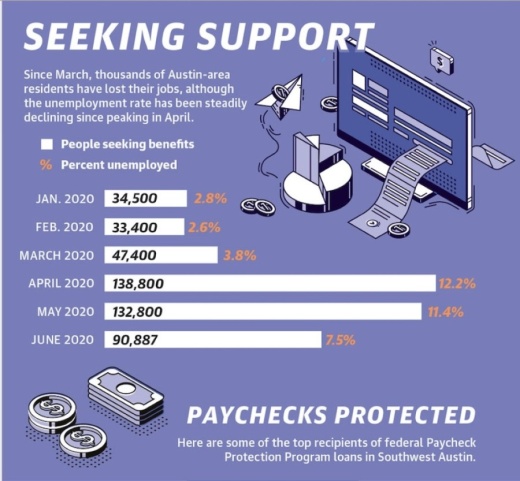Back in March, Zuniga was shifting his business model to include grocery delivery. It briefly buoyed his business enough that he hoped to be able to rehire most of his staff, which he had to lay off shortly after Hays County’s first stay-at-home order.
Now, Zuniga is looking for a new job himself. Even in a long career in the ever-changing restaurant business, he said this is a first.
“In 22 years of being in this industry, I guess I had to experience a pandemic,” Zuniga said.
Unemployment rates in the Austin-Round Rock Metropolitan Statistical Area peaked in April at 12.2%, according to the Texas Workforce Commission. While unemployment in the area had dipped to 6.9% as of July, that number towers over the 2.9% rate 12 months before.
Unemployment benefits statewide average around $349 per week, according to the Texas Workforce Commission. Prior to July 25, unemployed Texans were also eligible to receive an added federal benefit of $600 per week.
President Donald Trump has attempted to bridge the gap with an executive order that offers some continued support. On Aug. 21, Gov. Greg Abbott announced in a press release that the federal government approved funding for an additional $300 per week for Texans receiving unemployment benefits under the president's executive order.
Nationally, an Aug. 7 report from the Bureau of Labor Statistics found that 1.8 million jobs were added back in July and the unemployment rate fell from 11.1% to 10.2%.
Employers also await news after a program aimed at helping them retain workers expired Aug. 8. In the Southwest Austin and Dripping Springs area, the Small Business Administration reported in July that 402 businesses received at least $150,000 in Paycheck Protection Program aid, preserving more than 18,500 jobs.
TWC spokesperson Cisco Gamez said he has begun to see “glimpses of recovery” across certain sectors, especially in skilled trades, such as manufacturing and tech. However, the service industry continues to struggle, leading to closures of local businesses, such as Austin Java.
“I cannot tell you what my next chapter is,” Zuniga said. “But I can only dream to build the support and love from many of my guests that I have now.”
Jack Flagler contributed to this report.





